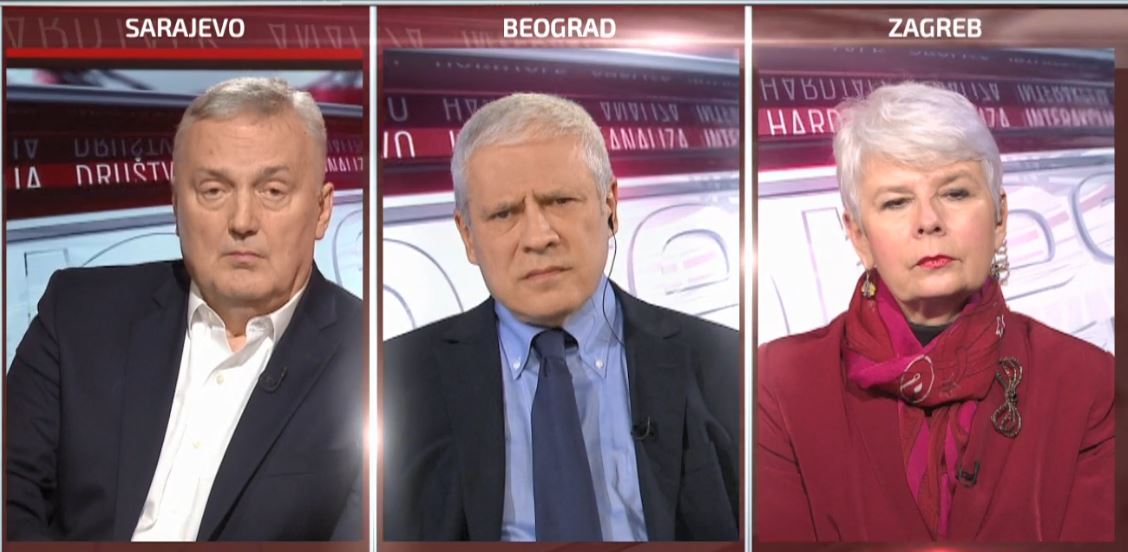Ex-officials slam current leaders in the region over poor political relations

Relations in the region are very bad and current politicians in power have no political courage and wisdom to move on, former leaders of Bosnia, Serbia and Croatia told N1 on Wednesday.
Jadranka Kosor, ex-prime minister of Croatia, believes this can change when a new generation of politicians, who won't think of their own but of the benefit of their countries and neighbours, come into power.
According to her, Serbia is today ruled by a leader who never managed to get rid of “wartime bonds and ties.”
“That's the fact,” Kosor stressed, referring to President Aleksandar Vucic. “Why do I speak of Vucic? Because the relations are bad.”
Disruptive factor in Bosnia and Herzegovina, according to her, is Milorad Dodik, who enjoys Vucic's support.
“The man who glorifies war criminals in the 21st century is not the person I could think of as someone who would be solving problems,” she stressed. “Dodik walks carrying kerosene buckets to allegedly stop the fire, while Vucic is handing him one at a time. That's how I see this situation.”
A step ahead in the relations between Bosnia and Croatia would be a soon meeting of Croatia's new President Zoran Milanovic and Bosnia's tripartite Presidency.
Boris Tadic, former President of Serbia, disagreed with the idea that Serbia is an exclusive disruptive factor in the region, saying that everyone seems to be competing in that.
“We are the region that is more inclined to conflicts than reconciliation, more irrational than rational. We are filled with emotions, we have a rough history and it is not simple to find solutions to the problems we are facing,” he said.
“I would advise Vucic to resign because he destroyed democracy in Serbia. The instruments and solutions that don't bring improvements demand changes,” stressed Tadic, adding that he strongly objects any secession in Bosnia and Herzegovina.
Asked if Serbia would recognise Republika Srpska, Bosnia's Serb-dominated semi-autonomous region if it attempted to secede, he replied:
“I don't know if Vucic's Serbia would but I would never do that. I believe it is the virtue of politics to think of other countries too and not only of their own.”
Bosnia's former prime minister, Zlatko Lagumdzija, deems that any change in relations in the region reflects on Bosnia the most.
“When everything is fine in the region, this is where it gets the best. Whenever things get upside down in the region, this is the place where it gets the worst,” he said.
“Traitors and foreign mercenaries” is what he called the disruptive factors in the region.
“All those who undermine the Dayton Agreement (a peace treaty that ended the 1992-95 Bosnian war) is a domestic traitor. The ones who pay them are some sort of a foreign occupier, stressed Lagumdzija, noting that there are “forces” that still have not given up on dividing Bosnia and Herzegovina.
He had a message for the leaders of the strongest political parties of three main ethnic groups in Bosnia.
"I would advise (Bosniak leader Bakir) Izetbegovic to never get tired of what he is saying, and that's that he will never allow Bosnia and Herzegovina's splitting up as a state. If he gave up, the biggest losers would be his voters. I would suggest (Serb leader Milorad) Dodik to be the Dodik from a different era, who behaved in an honourable way during the war. And I would tell Dragan (Covic, the Croat leader) to stop playing an all-or-nothing game because he will win nothing."
Kakvo je tvoje mišljenje o ovome?
Učestvuj u diskusiji ili pročitaj komentare





 Srbija
Srbija
 Hrvatska
Hrvatska
 Slovenija
Slovenija







